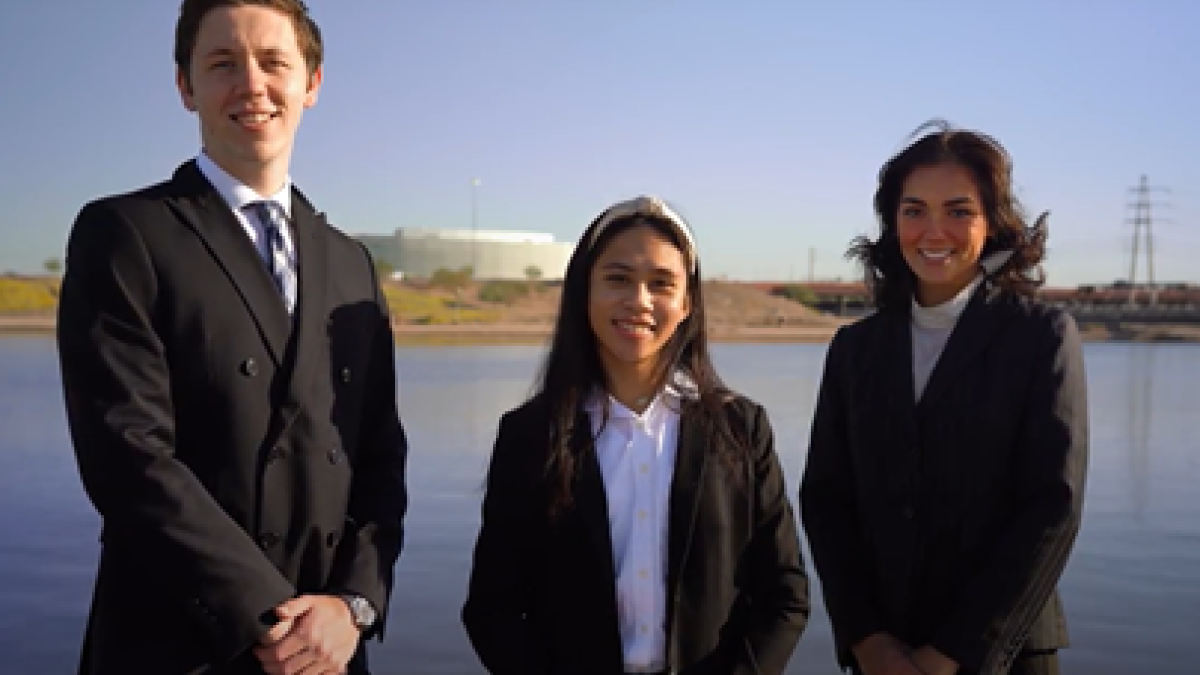ASU Founders Lab offers Barrett, The Honors College students entrepreneurial honors thesis ideas and opportunities

Barrett, The Honors College students (from left) Gage Reitzel, Aira Sadiasa and Marina Filipek teamed up on a project called Water Works in the ASU Founders Lab.
Barrett, The Honors College students looking for ideas, technical support and opportunities to develop honors thesis projects and entrepreneurial ventures are finding them in the Founders Lab at Arizona State University.
More than 35 Barrett students participated in the Founders Lab in 2019. Last year, that number grew to 98. In 2021, more than 100 students are expected to participate.
Founders Lab is a “thesis incubator” in which students are given thesis ideas they can develop into innovative and interesting projects, said Jared Byrne, Founders Lab project director.
“Students get a dynamic, interactive, applied experience that they can add their own creativity to,” Byrne said.
How does Founders Lab work?
Founders Lab is a team-based, experiential Barrett honors thesis/creative project designed to empower honors students to "find their inner entrepreneur" and launch a new business. Participants design and apply unique marketing and sales strategies, as well as business and financial models. Students work in teams of at least three. Students with any major may participate.
Founders Lab provides participants with a thesis committee, entrepreneurial resources, connections to industry networks, mentors and access to resources to help them succeed, Byrne said.
Gage Reitzel, a rising fourth-year Barrett student double-majoring in global health and psychology with a certificate in social science research methods, participated in the Founders Lab last year.
He worked on a team with Marina Filipek, who graduated in May with bachelor’s degrees in finance and business law, and Aira Sadiasa, a rising fourth-year student majoring in computer information systems, on a project called Water Works, which aims to address water insecurity and its risks, including compromised health and psychosocial well-being.
Reitzel said water insecurity due to natural and human-made disasters is an increasing problem worldwide.
According to a project description from Reitzel, Water Works focuses on a new device for the delivery of water, nutrition and medicine that will mitigate the distress and uncertainty between the period of a water supply’s disruption and its restoration.
The device, called the Personal Water Reclamation System, or PWRS, is a water purification device originally developed by NASA engineer Michael Flynn for use in space missions. PWRS is a filter bag that produces distilled, quality water through forward osmosis. This process does not require electricity to operate and relies on the evaporation and condensation of water molecules passing through a membrane.
The portable and lightweight PWRS can provide clean and safe water during long-term water and power outages and allows for the addition of Enfamil baby formula, Pedialyte electrolyte drink and medicines.
“I achieved what was a lifelong dream of mine to work with NASA in an operational capacity. Those engineers were some of my biggest heroes,” Reitzel said.
Reitzel, Filipek and Sadiasa participated with their project in the ASU Venture Devils funding competition and were named Social Impact Scholars.
Reitzel said this year the team began collaborating with Medline Industries, the largest privately held manufacturer and distributor of health care supplies in the United States. They also connected with Suresh Shenoy, former chairman of the American Red Cross National Capital Region and president of the Wheels Global Foundation, an organization that seeks to educate the public and incubate new technologies designed to purify water and find new sources of water, to discuss ways Water Works may be used to alleviate water scarcity in India.
The Water Works team also made a presentation about their project to the W. P. Carey School of Business Deans Council.
Reitzel said among the key lessons he learned in the Founders Lab are:
- The notion that failing fast and not dwelling on it is a hallmark of innovation from Dan Purtell, director of innovation at the British Standards Institute.
- The right people make or break ideas and experiences, and you need a team who gives it to you straight and with whom you can really sit down and collaborate.
- Especially during the coronavirus pandemic and in other situations when there are many things that require your attention, it is important to keep momentum and traction by making consistent effort.
- There is often a perceived separation of academia and the real world, but it is important to remember that a project does not have to remain as a pedagogical exercise if you believe in its mission.
Learn more about honors thesis pathways and the Founders Lab.
More Business and entrepreneurship
W. P. Carey School of Business celebrates new center and degree program for real estate, a vital industry for the state
As Arizona grows, so does the demand for places to live, work and connect. And with over 14% of the state's gross domestic…
Sustainability leader and ASU alum honored for transforming business with a people-first approach
Long before Jim Fish ('86 BS in accountancy) became president and CEO of WM — formally Waste Management — in 2016, he…

ASU business students take on the big leagues
Each year, sports fans from across the country flock to Arizona to attend major events like the Waste Management Phoenix Open,…

